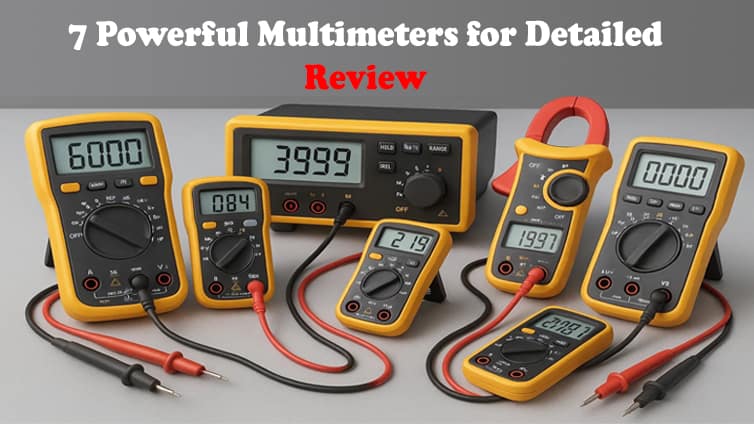 7 Powerful Multimeters for Electronics Projects | Detailed Review & Guide
7 Powerful Multimeters for Electronics Projects | Detailed Review & Guide
A multimeter is the most essential tool for electronics projects, DIY repairs, and electrical troubleshooting. This detailed review covers the 7 best multimeters you can buy today. From accuracy to durability, each multimeter is analyzed with specs, pros, and cons. Whether you’re a beginner, hobbyist, or professional engineer, discover which multimeter suits your needs.
Introduction
When working on electronics projects, one tool you can’t live without is a multimeter. It allows you to measure voltage, current, resistance, continuity, and even advanced parameters like frequency and capacitance.
Choosing the right multimeter can be confusing because there are so many options—ranging from budget-friendly models for students to professional-grade instruments trusted by engineers.
This guide reviews the 7 best multimeters for electronics projects. We’ll cover features, specifications, pros and cons, and real-life applications so you can pick the perfect one for your needs.
Buying Guide: What to Look for in a Multimeter
Before jumping into the reviews, here are some factors you must consider:
1. Accuracy
Look for True RMS meters for precise AC measurements.
High-end models (Fluke, Keysight) offer excellent accuracy.
2. Auto-Range vs Manual
Auto-range saves time by automatically selecting the right measurement range.
Manual range is cheaper but less convenient.
3. Safety Ratings
Check CAT ratings (CAT II, CAT III, CAT IV).
Higher CAT = safer for industrial use.
4. Build Quality
Rubberized casing for durability.
Good-quality test probes are a must.
5. Extra Features
Capacitance, frequency, temperature measurement.
Backlit display for dark environments.
Data hold & auto power-off.
The 7 Best Multimeters for Electronics Projects
1. Fluke 117 – Professional Grade Multimeter
Why it’s great: Fluke is the gold standard in test equipment. The Fluke 117 is designed for professionals who demand accuracy, reliability, and safety.
Specifications:
| Feature | Details |
|---|---|
| Accuracy | ±0.5% |
| Display | Backlit, True RMS |
| Safety | CAT III 600V |
| Extra | Low input impedance, Non-contact voltage |
Pros:
Extremely durable and reliable
True RMS ensures accurate AC readings
Excellent safety rating
Cons:
Expensive for beginners
Best For: Professional electricians & engineers.
2. UNI-T UT61E – Affordable High Accuracy
Why it’s great: Offers high accuracy at a fraction of the price compared to Fluke.
Specifications:
| Feature | Details |
|---|---|
| Accuracy | ±0.1% |
| Display | 22,000 count LCD |
| Safety | CAT III 1000V |
| Extra | PC connectivity |
Pros:
Excellent accuracy for the price
PC interface for data logging
Affordable
Cons:
Build quality not as robust as Fluke
Best For: Students & hobbyists who need precision.
3. Klein Tools MM400 – Electrician’s Choice
Why it’s great: Reliable brand for electricians with rugged build quality.
Specifications:
| Feature | Details |
|---|---|
| Accuracy | ±1% |
| Display | Backlit LCD |
| Safety | CAT III 600V |
| Extra | Measures temperature |
Pros:
Rugged design
Easy-to-read display
Affordable professional option
Cons:
Not as feature-rich as Fluke
Best For: Field electricians & technicians.
4. AstroAI Digital Multimeter TRMS 6000 – Budget Starter
Why it’s great: Best-selling beginner-friendly multimeter on Amazon.
Specifications:
| Feature | Details |
|---|---|
| Accuracy | ±1.5% |
| Display | 6000 counts |
| Safety | CAT II 600V |
| Extra | Data hold, Auto shutoff |
Pros:
Very affordable
Decent accuracy
Good for learning basics
Cons:
Limited safety rating
Not suitable for industrial use
Best For: Beginners, DIY repairs, and students.
5. ANENG AN8008 – Compact DIY Multimeter
Why it’s great: Lightweight, portable, and full of features for hobbyists.
Specifications:
| Feature | Details |
|---|---|
| Accuracy | ±0.5% |
| Display | 9999 count |
| Safety | CAT III 600V |
| Extra | Capacitance, Frequency, NCV |
Pros:
Very compact & portable
Excellent feature set for price
Good accuracy
Cons:
Build quality is average
Probes feel cheap
Best For: Hobbyists & makers.
6. Extech EX330 – Mid-Range with Temperature
Why it’s great: A versatile multimeter with temperature measurement included.
Specifications:
| Feature | Details |
|---|---|
| Accuracy | ±0.5% |
| Display | 4000 counts |
| Safety | CAT III 600V |
| Extra | K-Type Thermocouple |
Pros:
Measures temperature
Compact design
Reliable brand
Cons:
Small display
Not as rugged as Fluke
Best For: DIYers who need extra features.
7. Amprobe AM-510 – Durable & Safe
Why it’s great: Known for durability and high safety standards.
Specifications:
| Feature | Details |
|---|---|
| Accuracy | ±0.8% |
| Display | Backlit |
| Safety | CAT III 600V, CAT IV 300V |
| Extra | Non-contact voltage detection |
Pros:
Strong safety rating
Rugged build
Backlit screen
Cons:
Limited advanced features
Best For: Technicians who need a safe, durable meter.
Comparison Table
| Model | Accuracy | Safety Rating | Display | Extra Features | Best For |
|---|---|---|---|---|---|
| Fluke 117 | ±0.5% | CAT III 600V | Backlit, TRMS | NCV | Professionals |
| UNI-T UT61E | ±0.1% | CAT III 1000V | 22,000 count | PC Link | Students |
| Klein MM400 | ±1% | CAT III 600V | Backlit | Temp measurement | Electricians |
| AstroAI TRMS 6000 | ±1.5% | CAT II 600V | 6000 count | Auto-shutoff | Beginners |
| ANENG AN8008 | ±0.5% | CAT III 600V | 9999 count | NCV, Capacitance | Hobbyists |
| Extech EX330 | ±0.5% | CAT III 600V | 4000 count | Thermocouple | DIYers |
| Amprobe AM-510 | ±0.8% | CAT III 600V | Backlit | NCV | Technicians |
Circuit Usage Example
![Simple Circuit Diagram Placeholder]
Example: Measuring a 9V battery voltage with a multimeter.
Set the multimeter to DC Voltage.
Connect the red probe to the positive terminal and black to negative.
Reading should show around 9.0V if the battery is healthy.
BOM (Bill of Materials with Buy Links)
| Item | Model | Buy Link |
|---|---|---|
| Multimeter (Pro) | Fluke 117 | Buy Link |
| Multimeter (Student) | UNI-T UT61E | Buy Link |
| Multimeter (Budget) | AstroAI TRMS 6000 | Buy Link |
| Test Probes | Fluke TL75 | Buy Link |
| Temperature Probe | K-Type Thermocouple | Buy Link |
| Safety Gloves | Electrical Insulated | Buy Link |
| Circuit Components | Resistors, Battery, Wires | Buy Link |
| DIY Tools | Breadboard & Kits | Buy Link |
FAQs
Q1: Which multimeter is best for beginners?
AstroAI TRMS 6000 or ANENG AN8008.
Q2: Do I need a True RMS multimeter?
Yes, if you’re measuring AC circuits with non-linear loads.
Q3: Can I use a cheap multimeter for high voltage?
No. Always check the CAT safety rating.
Q4: What’s the difference between auto-range and manual?
Auto-range adjusts automatically; manual requires you to select the range.
Q5: Which brand is the most reliable?
Fluke is the most trusted professional brand.
Q6: Are PC-connected multimeters useful?
Yes, for logging and analysis in labs.
Q7: Can I measure current with all multimeters?
Yes, but check max current rating (usually 10A).
Q8: Can multimeters test diodes?
Yes, most digital multimeters have a diode test mode.
Q9: How long does a multimeter last?
A good one (like Fluke) can last 10+ years.
Q10: What’s the safest option?
Fluke 117 and Amprobe AM-510 with CAT ratings.
Final Recommendation
Best Overall: Fluke 117 (Professional, safe, accurate)
Best Budget: AstroAI TRMS 6000 (Affordable for beginners)
Best Student Option: UNI-T UT61E (High accuracy, low cost)
Best Hobby Choice: ANENG AN8008 (Portable, feature-rich)
Whether you’re just starting out or already working as a professional engineer, one of these 7 powerful multimeters will fit your electronics projects perfectly.


 7 Powerful Multimeters for Electronics Projects | Detailed Review & Guide
7 Powerful Multimeters for Electronics Projects | Detailed Review & Guide





